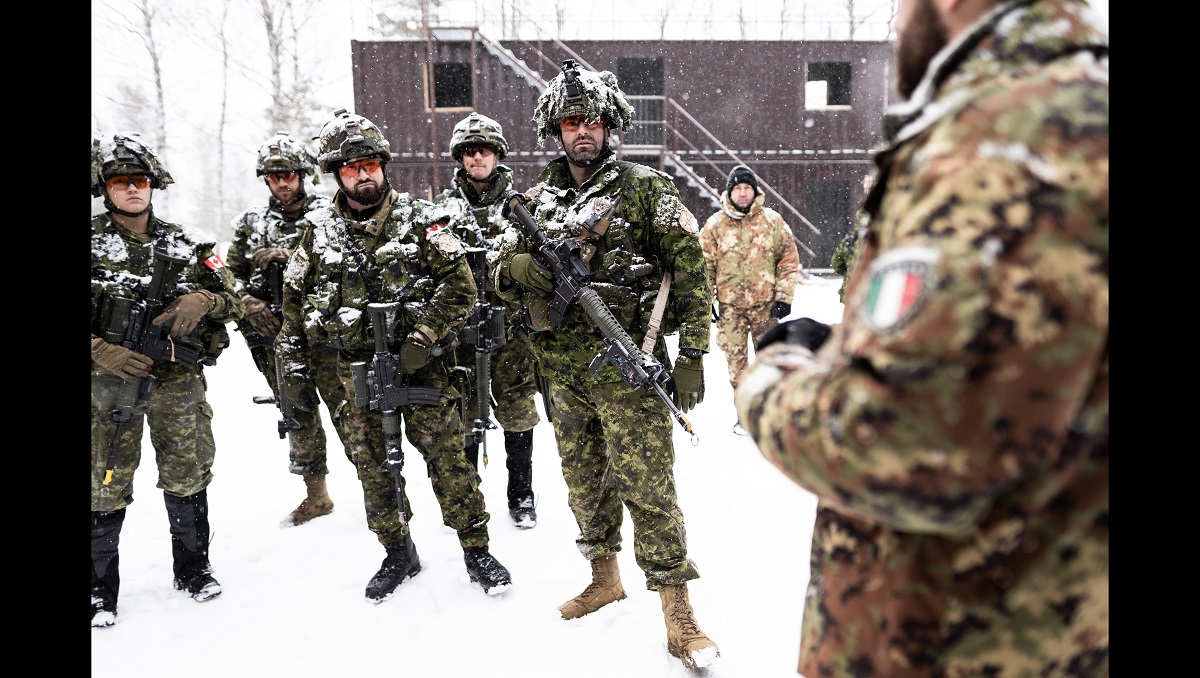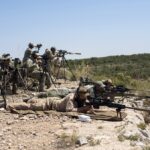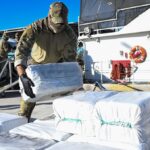
The Russian invasion of Ukraine has revived interest in and discussions about NATO. When 31 countries, each with their own national interests and goals, come together, interoperability becomes a driving consideration. Giovanni Corrado and Joel Gleason conducted a study of NATO interoperability and doctrine as their research project for the Carlisle Scholars program at the U.S. Army War College. They join podcast editor Ron Granieri to share the findings of numerous interviews and studies. What they found was that despite all the different languages, interests, equipment and procedures, multinational formations on the battlefield make it work. Much of that is due to well-formed doctrine that most members aren’t aware of in their daily routine.
Doctrine is not meant to be something that you have to pull out when you’re in the foxhole in order to succeed. It’s meant to be something that gives us a common foundation so that when we operate together common sense is tied by some initial ideas that we all have that are the same.
Podcast: Download
Subscribe: Android | Email | RSS
Giovanni Corrado is a colonel and an airborne infantry officer with a second specialty in intelligence in the Italian Army. He was an International Fellow, a member of the Carlisle Scholars Program and a graduate of the AY23 Resident Course at the U.S. Army War College.
Joel P. Gleason is a colonel and a logistics officer in the United States Army. He has published a number of professional articles, including a 2016 article on allied parallel planning published through the center for Army lessons learned (CALL) that became the basis of an Annex in NATO’s publication for tactical planning in the land domain, Allied Planning Pub 28. He was a member of the Carlisle Scholars Program and a graduate of the AY23 Resident Course at the U.S. Army War College. After graduation Joel will serve as the V CORPS G5.
Ron Granieri is Professor of History at the U.S. Army War College and the Editor of A BETTER PEACE.
The views expressed in this presentation are those of the speakers and do not necessarily reflect those of the U.S. Army War College, U.S. Army, or Department of Defense.
Photo Description: Soldiers with the Canadian Army’s 2nd Battalion, Royal 22 Regiment receive urban operations training from an Italian soldier in Adazi, Latvia. The Canadian and Italian troops are in Latvia as part of NATO’s enhanced Forward Presence. Canada leads the battlegroup. 13 Feb 2019
Photo Credit: Courtesy of NATOChannel Communication Services, Public Diplomacy Division, NATO Headquarters





As to “managing NATO’s interests and interoperability,” can anyone point me to the appropriate portion, of the appropriate NATO “doctrine” document, which discusses such things as how NATO will deal with/is presently dealing with our opponents’ (those both here at home and there abroad) common objection to such things as (a) present-day (and/or aspired-to) democracy, (b) present-day (and/or aspired-to) human rights and (c) present-day (and/or aspired-to) market economy?
(These such opponents [those both here at home and there abroad] not seeing such things as present-day and/or aspired-to democracy, present-day and/or aspired-to human rights and/or present-day and/or aspired-to market economy as being in their best interests.)
As to my question above, note that — in “The Charter of Paris for a New Europe” (the Old Cold War “surrender document”/the Old Cold War “peace treaty”) — democracy, human rights and a market-economy are what everyone (to include the-then Soviet Union) signed up for:
“We undertake to build, consolidate and strengthen democracy as the only system of government of our nations.” (See Page 3 of “The Treaty of Paris for a New Europe.”)
“Human rights and fundamental freedoms are the birthright of all human beings, are inalienable and are guaranteed by law. Their protection and promotion is the first responsibility of government. Respect for them is an essential safeguard against an overmighty State. Their observance and full exercise are the foundation of freedom, justice and peace.” (Also see Page 3.)
“Freedom and political pluralism are necessary elements in our common objective of developing market economies towards sustainable economic growth, prosperity, social justice, expanding employment and efficient use of economic resources.” (See Page 4.)
(Thus, if you wish to understand who NATO’s enemies/opponents/competitors are today — and thus who we must defend against via NATO and other means — then you may need to look no further than those individuals and groups — and those states and societies — both here at home in the U.S./the West and there abroad elsewhere — who see such things as democracy, human rights and a market economy as [a] threating the power, influence and control that they presently have and/or [b] threating the power, influence and control that desire to achieve and/or reclaim?)